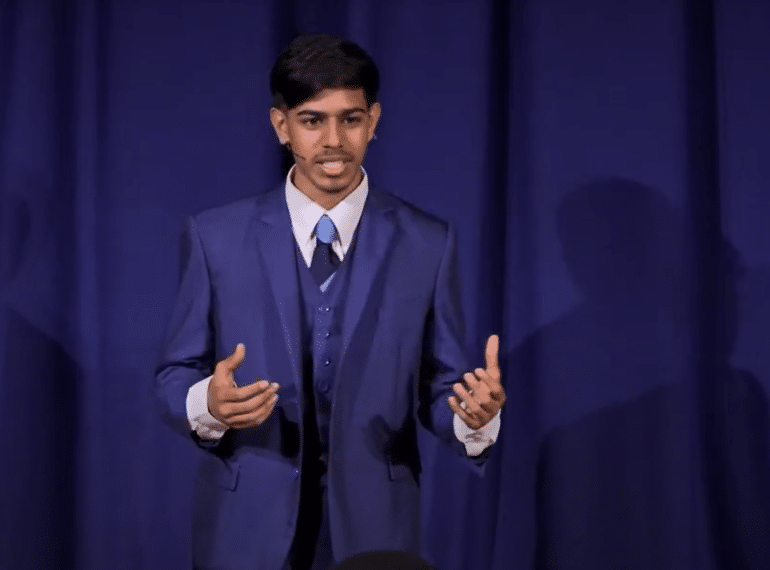“Reasoned and powerful” presentation on genetics wins gold award and more than £10,000 for QE sixth-former

Year 12’s Nikhil Banerjee took first prize in a national competition with his five-minute presentation on the ethics of using genome editing to eradicate genetic diseases.
 He beat more than 400 entrants – and 11 other finalists – to triumph in the Gresham Oracy Competition run by Gresham College, London’s oldest higher education institute.
He beat more than 400 entrants – and 11 other finalists – to triumph in the Gresham Oracy Competition run by Gresham College, London’s oldest higher education institute.
The chair of the judging panel, Professor Sarah Hart, said: “Nikhil’s presentation in particular demonstrated a thorough grasp of a complex issue, one of the most challenging ethical debates of our time. His argument was reasoned and powerful.”
Headmaster Neil Enright said: “My heartfelt congratulations go to Nikhil on this achievement. The aims of this competition correspond closely with QE’s emphases on nurturing free-thinking scholarship alongside speaking and presentation skills. Our current major building project, The Robert Dudley Studio, a dedicated space for drama and the spoken word, will further increase opportunities for our pupils to develop their proficiency in oracy.”
Nikhil entered the competition after reading about it in the new QE Futures Opportunities Bulletin prepared by Assistant Head (Pupil Destinations) James Kane.
Following his success in the final held at the college’s Barnard’s Inn Hall in Holborn, Nikhil wins £9,250 towards his university tuition and £1,000 for a laptop. QE receives £1,000 to develop its “academic programmes and curricular activities”.
The competition’s questions were set by leading UK lecturers connected to Gresham College and covered subjects ranging from the exploration of space to the role of music in helping ameliorate mental health issues in young people.
The question Nikhil answered was: Could genome editing consign genetic diseases to history and would that be ethical?
 He began his presentation with the poetic account of human origins in the book of Genesis – “And so God created mankind in his own image, in the image of God he created them, male and female he created them,” continuing “And yet science endeavours to go one step further, to defy imperfection, to alleviate prodigious amounts of suffering, and to alter the very make-up of you and me.”
He began his presentation with the poetic account of human origins in the book of Genesis – “And so God created mankind in his own image, in the image of God he created them, male and female he created them,” continuing “And yet science endeavours to go one step further, to defy imperfection, to alleviate prodigious amounts of suffering, and to alter the very make-up of you and me.”
He pointed out that, in one sense, humans had been interfering with DNA for thousands of years, from “domesticating wild animals to selectively breeding plants with better taste”.
What made the new technology different was the huge possibilities it opened up for treating disease. Nikhil outlined the unpredictable effects of editing genes – including death – and the pharmacological causes of those failures. But he was sanguine about the prospects for successfully overcoming such problems.
We should, however, be afraid of the use of the technology beyond the need to treat disease, he said. “What’s to stop us editing our traits – how we look, how strong we are, even how smart we are. What’s to stop the wealthy from buying a perfect genetic make-up?…We would be losing core human values such as unconditional love – loving a person despite their imperfections.”
In his conclusion, Nikhil stated: “The opportunities afforded to us by gene-editing are exciting, but in order for us to harness these, stringent legislation is required, which can only be achieved through a collaborative effort by scientists and ethicists around the world. After all, who are we to decide what way of life is worth living?”
He then immediately responded to questions from the judges.
Modest in his success, Nikhil himself said afterwards: “It was such an honour to make it to the final and I can’t believe that I’ve won against such a competitive field.
“The prize will make a big difference in supporting my further education, and it’s great that my school benefits too as they have supported me throughout this journey.”
Nikhil is pictured with Professor Martin Elliott, Provost at the college, who said: “Through our competition, students were not only able to showcase their oracy skills but also engage with significant academic research that will open them up to new areas of learning.”
Gresham College, the first institute of Higher Education in London, has been providing free public education across the arts and sciences since 1597 and is a registered charity. Through the competition, it aims to showcase the importance of oracy competence and the art of communicating.
The judging panel comprised:
- Professor Sarah Hart – Professor of Geometry at Gresham College
- Deputy Nighat Qureishi – Gresham College Council Member
- Nav Ahmed – Principal Lecturer, Arden University
- Mary-Clare Davies – Director of Global Education, Mulberry School for Girls
- AJ Haseley – Co-Founder & CEO of AYM Media Group
